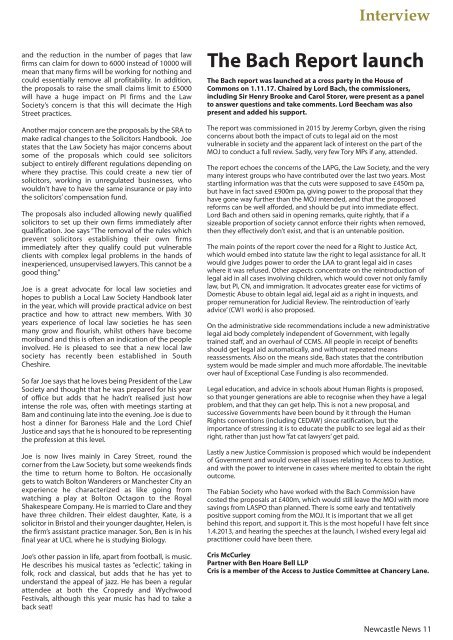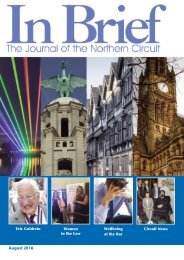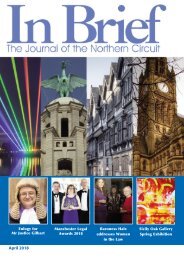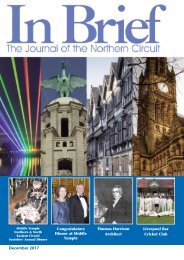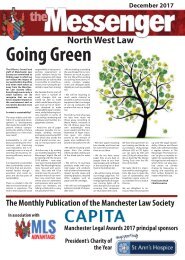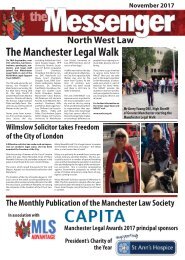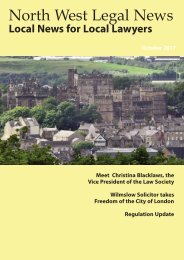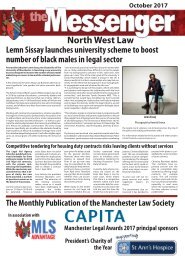Newcastle News November 2017
Create successful ePaper yourself
Turn your PDF publications into a flip-book with our unique Google optimized e-Paper software.
Interview<br />
and the reduction in the number of pages that law<br />
firms can claim for down to 6000 instead of 10000 will<br />
mean that many firms will be working for nothing and<br />
could essentially remove all profitability. In addition,<br />
the proposals to raise the small claims limit to £5000<br />
will have a huge impact on PI firms and the Law<br />
Society’s concern is that this will decimate the High<br />
Street practices.<br />
Another major concern are the proposals by the SRA to<br />
make radical changes to the Solicitors Handbook. Joe<br />
states that the Law Society has major concerns about<br />
some of the proposals which could see solicitors<br />
subject to entirely different regulations depending on<br />
where they practise. This could create a new tier of<br />
solicitors, working in unregulated businesses, who<br />
wouldn't have to have the same insurance or pay into<br />
the solicitors’ compensation fund.<br />
The proposals also included allowing newly qualified<br />
solicitors to set up their own firms immediately after<br />
qualification. Joe says “The removal of the rules which<br />
prevent solicitors establishing their own firms<br />
immediately after they qualify could put vulnerable<br />
clients with complex legal problems in the hands of<br />
inexperienced, unsupervised lawyers. This cannot be a<br />
good thing.”<br />
Joe is a great advocate for local law societies and<br />
hopes to publish a Local Law Society Handbook later<br />
in the year, which will provide practical advice on best<br />
practice and how to attract new members. With 30<br />
years experience of local law societies he has seen<br />
many grow and flourish, whilst others have become<br />
moribund and this is often an indication of the people<br />
involved. He is pleased to see that a new local law<br />
society has recently been established in South<br />
Cheshire.<br />
So far Joe says that he loves being President of the Law<br />
Society and thought that he was prepared for his year<br />
of office but adds that he hadn’t realised just how<br />
intense the role was, often with meetings starting at<br />
8am and continuing late into the evening. Joe is due to<br />
host a dinner for Baroness Hale and the Lord Chief<br />
Justice and says that he is honoured to be representing<br />
the profession at this level.<br />
Joe is now lives mainly in Carey Street, round the<br />
corner from the Law Society, but some weekends finds<br />
the time to return home to Bolton. He occasionally<br />
gets to watch Bolton Wanderers or Manchester City an<br />
experience he characterized as like going from<br />
watching a play at Bolton Octagon to the Royal<br />
Shakespeare Company. He is married to Clare and they<br />
have three children. Their eldest daughter, Kate, is a<br />
solicitor in Bristol and their younger daughter, Helen, is<br />
the firm’s assistant practice manager. Son, Ben is in his<br />
final year at UCL where he is studying Biology.<br />
Joe’s other passion in life, apart from football, is music.<br />
He describes his musical tastes as “eclectic’, taking in<br />
folk, rock and classical, but adds that he has yet to<br />
understand the appeal of jazz. He has been a regular<br />
attendee at both the Cropredy and Wychwood<br />
Festivals, although this year music has had to take a<br />
back seat!<br />
The Bach Report launch<br />
The Bach report was launched at a cross party in the House of<br />
Commons on 1.11.17. Chaired by Lord Bach, the commissioners,<br />
including Sir Henry Brooke and Carol Storer, were present as a panel<br />
to answer questions and take comments. Lord Beecham was also<br />
present and added his support.<br />
The report was commissioned in 2015 by Jeremy Corbyn, given the rising<br />
concerns about both the impact of cuts to legal aid on the most<br />
vulnerable in society and the apparent lack of interest on the part of the<br />
MOJ to conduct a full review. Sadly, very few Tory MPs if any, attended.<br />
The report echoes the concerns of the LAPG, the Law Society, and the very<br />
many interest groups who have contributed over the last two years. Most<br />
startling information was that the cuts were supposed to save £450m pa,<br />
but have in fact saved £900m pa, giving power to the proposal that they<br />
have gone way further than the MOJ intended, and that the proposed<br />
reforms can be well afforded, and should be put into immediate effect.<br />
Lord Bach and others said in opening remarks, quite rightly, that if a<br />
sizeable proportion of society cannot enforce their rights when removed,<br />
then they effectively don’t exist, and that is an untenable position.<br />
The main points of the report cover the need for a Right to Justice Act,<br />
which would embed into statute law the right to legal assistance for all. It<br />
would give Judges power to order the LAA to grant legal aid in cases<br />
where it was refused. Other aspects concentrate on the reintroduction of<br />
legal aid in all cases involving children, which would cover not only family<br />
law, but PI, CN, and immigration. It advocates greater ease for victims of<br />
Domestic Abuse to obtain legal aid, legal aid as a right in inquests, and<br />
proper remuneration for Judicial Review. The reintroduction of ‘early<br />
advice’ (CW1 work) is also proposed.<br />
On the administrative side recommendations include a new administrative<br />
legal aid body completely independent of Government, with legally<br />
trained staff, and an overhaul of CCMS. All people in receipt of benefits<br />
should get legal aid automatically, and without repeated means<br />
reassessments. Also on the means side, Bach states that the contribution<br />
system would be made simpler and much more affordable. The inevitable<br />
over haul of Exceptional Case Funding is also recommended.<br />
Legal education, and advice in schools about Human Rights is proposed,<br />
so that younger generations are able to recognise when they have a legal<br />
problem, and that they can get help. This is not a new proposal, and<br />
successive Governments have been bound by it through the Human<br />
Rights conventions (including CEDAW) since ratification, but the<br />
importance of stressing it is to educate the public to see legal aid as their<br />
right, rather than just how ‘fat cat lawyers’ get paid.<br />
Lastly a new Justice Commission is proposed which would be independent<br />
of Government and would oversee all issues relating to Access to Justice,<br />
and with the power to intervene in cases where merited to obtain the right<br />
outcome.<br />
The Fabian Society who have worked with the Bach Commission have<br />
costed the proposals at £400m, which would still leave the MOJ with more<br />
savings from LASPO than planned. There is some early and tentatively<br />
positive support coming from the MOJ. It is important that we all get<br />
behind this report, and support it. This is the most hopeful I have felt since<br />
1.4.2013, and hearing the speeches at the launch, I wished every legal aid<br />
practitioner could have been there.<br />
Cris McCurley<br />
Partner with Ben Hoare Bell LLP<br />
Cris is a member of the Access to Justice Committee at Chancery Lane.<br />
<strong>Newcastle</strong> <strong>News</strong> 11


